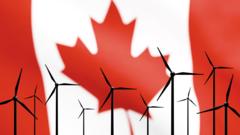As Canada approaches its federal election, the debate over fossil fuel policies is heating up, overshadowing environmental discussions and reflecting shifting voter priorities amid economic concerns.
Canada's Election: Fossil Fuels Take Center Stage as Climate Concerns Fade

Canada's Election: Fossil Fuels Take Center Stage as Climate Concerns Fade
Candidates focus on energy policy amidst rising costs and geopolitical tensions
The Canadian federal election is shaping up around energy policies, with leading candidates emphasizing fossil fuels over climate action. Prime Minister Mark Carney of the Liberal Party and Conservative challenger Pierre Poilievre propose contrasting visions for Canada's energy future, highlighting how recent geopolitical events and economic pressures have shifted priorities from climate change.
Historically, environmental issues dominated Canadian political discourse, particularly during the 2021 elections when consensus was favoring a rapid green transition. Fast forward to 2025, and the focus has pivoted significantly. Carney aims to establish Canada as a dual-energy superpower, blending conventional and green energy, while Poilievre seeks to rejuvenate the oil and gas sector and abolish the industrial carbon tax, a significant initiative previously supported by the Liberals.
The shift is stark considering Carney's recent repeal of the carbon levy, a move criticized by climate advocates who argue it undermines the narrative that climate policy is financially burdensome. Meanwhile, the rising concerns around living costs and global resource independence, particularly due to the war in Ukraine and shifting U.S. relations, have further complicated the political landscape.
Poilievre, drawing from a strong base in energy-centric regions, is bankrolling the oil and gas industry expansion, arguing that cleaner Canadian resources could replace pollution-heavy fossil fuels elsewhere. However, critics suggest that the underlying economic viability of such plans warrants scrutiny.
Despite pressing climate challenges, such as the severe wildfire season and rising weather-related insurance losses, voter interest in climate policy appears to be waning. Instead, the dominant concern centers on how to manage Canada’s relationship with a more aggressive U.S., especially concerning energy supplies.
Both parties recognize the strategic importance of oil and gas transport from Western provinces, with movements to revitalize pipeline projects that had previously faced intense opposition. The candidates have generally endorsed the development of energy corridors, albeit with varying degrees of commitment to environmental considerations.
As election day approaches on April 28, the clash over fossil fuels and climate policies looms large. The ultimate victor will face the daunting task of reconciling energy needs with Canada's climate commitments—promising to cap carbon emissions significantly, yet grappling with industry pressures and public sentiment against carbon curbing measures.
Historically, environmental issues dominated Canadian political discourse, particularly during the 2021 elections when consensus was favoring a rapid green transition. Fast forward to 2025, and the focus has pivoted significantly. Carney aims to establish Canada as a dual-energy superpower, blending conventional and green energy, while Poilievre seeks to rejuvenate the oil and gas sector and abolish the industrial carbon tax, a significant initiative previously supported by the Liberals.
The shift is stark considering Carney's recent repeal of the carbon levy, a move criticized by climate advocates who argue it undermines the narrative that climate policy is financially burdensome. Meanwhile, the rising concerns around living costs and global resource independence, particularly due to the war in Ukraine and shifting U.S. relations, have further complicated the political landscape.
Poilievre, drawing from a strong base in energy-centric regions, is bankrolling the oil and gas industry expansion, arguing that cleaner Canadian resources could replace pollution-heavy fossil fuels elsewhere. However, critics suggest that the underlying economic viability of such plans warrants scrutiny.
Despite pressing climate challenges, such as the severe wildfire season and rising weather-related insurance losses, voter interest in climate policy appears to be waning. Instead, the dominant concern centers on how to manage Canada’s relationship with a more aggressive U.S., especially concerning energy supplies.
Both parties recognize the strategic importance of oil and gas transport from Western provinces, with movements to revitalize pipeline projects that had previously faced intense opposition. The candidates have generally endorsed the development of energy corridors, albeit with varying degrees of commitment to environmental considerations.
As election day approaches on April 28, the clash over fossil fuels and climate policies looms large. The ultimate victor will face the daunting task of reconciling energy needs with Canada's climate commitments—promising to cap carbon emissions significantly, yet grappling with industry pressures and public sentiment against carbon curbing measures.






















